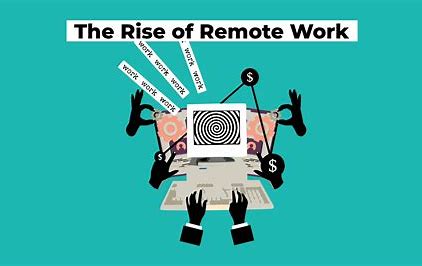The Rise of Remote Work in Africa: Opportunities, Challenges, and the Tech Behind It
By Rebecca Aboagyewah Oppong | Veebeckz Tech Media | Published on 18th June, 2024
Introduction
The COVID-19 pandemic didn’t just change how we live — it redefined how we work. Across Africa, remote work has evolved from a temporary emergency measure into a lasting professional shift. From developers in Kumasi to digital marketers in Nairobi, Africans are now part of a global talent pool—working for companies in Europe, the U.S., and Asia without ever leaving their homes.
But remote work in Africa isn't just about Zoom calls and laptops. It’s about access, infrastructure, skills, and opportunity. At Veebeckz Tech Hub, we believe remote work is one of the most powerful ways to bridge the unemployment gap and empower young Africans, especially women and persons with disabilities.
Let’s explore how this revolution is unfolding — and how you can ride the wave.
1. Why Remote Work Matters in Africa
Africa has the world’s youngest population, yet job creation hasn’t kept pace. Remote work opens doors for:
- Youth employment in digital roles
- Women who balance work and family
- Freelancers in design, coding, writing, and virtual assistance
- Diaspora integration, allowing Africans abroad to collaborate with teams back home
At Veebeckz Tech Hub, we believe that with the right approach to Remote jobs, it will drastically reduce unemployment and significantly increase the potential of the youth on the continent.
2. In-Demand Remote Roles from Africa
Here are some of the most accessible and in-demand remote jobs you can do from anywhere in Ghana:
- Web Developer
- Virtual Assistant
- Digital Marketer
- UI/UX Designer
- Customer Support
- Data Analyst
Byte Explorers Ghana and ALX Ghana now trains SHS leavers in digital freelancing and remote internships — some even earn in USD through platforms like Upwork and Turing.
3. The Tech That Makes Remote Work Possible
Remote work relies heavily on these tools:
- Communication: Zoom, Google Meet, Microsoft Teams
- Project Management: Trello, Asana, Notion
- Code Collaboration: GitHub, GitLab
- Cloud Storage: Google Drive, Dropbox
- Time Tracking & Payroll: Toggl, Deel, Remote.com
Even WhatsApp has become an unofficial productivity tool across African businesses!
4. Challenges of Remote Work in Africa
Despite its promise, remote work faces real barriers:
- Unstable internet: Many rural areas in Ghana still struggle with consistent connectivity
- Power outages: “Dumsor” can interrupt meetings and deadlines
- Digital exclusion: Many people lack laptops, digital skills, or quiet workspaces
- Isolation and burnout: Remote workers often feel disconnected or overworked
At Veebeckz, we’ve created Remote Work Starter Kits — which include data packages, power banks, and ergonomic guides — to help new freelancers stay productive.
5. How to Start Your Remote Work Journey
- Identify your skill – Are you a writer? Developer? Admin-savvy?
- Learn online – Use Coursera, Udemy, YouTube to upskill.
- Build a portfolio – GitHub, Behance, or a personal website.
- Join platforms – Try Upwork, Fiverr, Toptal, or local ones like Kuhustle and Terawork.
- Pitch professionally – Write clear proposals, customize your CV, and show real work samples.
Need help? Veebeckz offers CV revamps, mock interviews, and client communication workshops.
6. Local Solutions and Co-working Culture
In Ghana, hubs like iSpace (Accra), Kumasi Hive, and Veebeckz Tech Hub (Eastern Region) are filling the remote gap by offering:
- High-speed internet
- Quiet workspaces
- Mentorship programs
- Access to remote internships
We also host the “Remote Ready Ghana” Bootcamp — a 2-week program that grooms job seekers for international remote work opportunities.
Conclusion
Remote work is not just a Western trend — it’s a pan-African opportunity. For Africa’s youth, it’s a pathway to economic freedom, global exposure, and inclusive growth. But we must build the infrastructure, policies, and skills to make it sustainable
